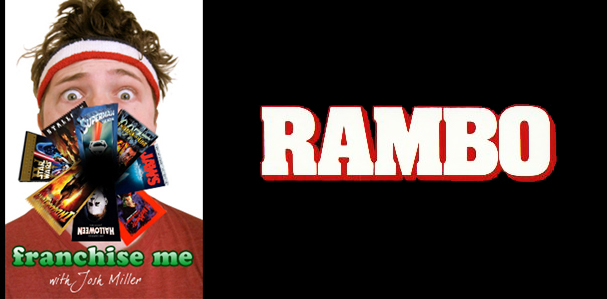
Hollywood loves a good franchise. The movie-going public does too. Horror, action, comedy, sci-fi, western, no genre is safe. And any film, no matter how seemingly stand-alone, conclusive, or inappropriate to sequel, could generate an expansive franchise. They are legion. We are surrounded. But a champion has risen from the rabble to defend us. Me. I have donned my sweats and taken up cinema’s gauntlet. Don’t try this at home. I am a professional.
Let’s be buddies on the Facebookz!
The Franchise: Rambo — following the turbulent and corpse-strewn misadventures of an emotionally damaged and highly skilled Green Beret and Vietnam War veteran named John Rambo. Based on the novel First Blood by David Morrell, the franchise has spanned four feature films, a television cartoon, numerous video games and comic books, from 1982-2008.
previous installments:
First Blood
Rambo: First Blood Part II
Rambo: The Force of Freedom
The Installment: Rambo III (1988)
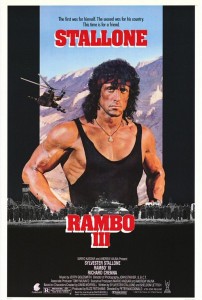
The Story:
When trouble once more plagues the foreign world – trouble that can only be quelled by the most badass of badasses – Col. Trautman again seeks out John Rambo, who is now living amongst Buddhist monks and earning money for their temple by stick-fighting locals for cash. Trautman wants Rambo to join him in Afghanistan to help the Mujahideen fight the USSR. But Rambo is all, “No way, my war is over.” Then Trautman goes in and gets taken prisoner, so then Rambo is all, “Send me in!” So Rambo goes in, joins the Mujahideen, makes some friends, plays football with a dead sheep instead of a ball, then fucks some shit up, Rambo-style.
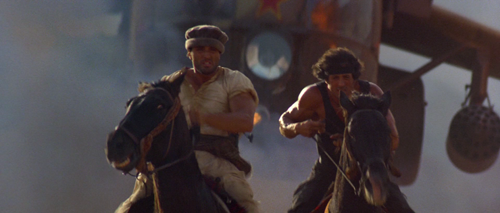
What Works:
Rambo III cost a whopping $62 million (whopping in 1988 dollars); at the time the most expensive movie ever made. And the one thing you certainly can’t deny the film is that it looks expensive. Israel doubles for Afghanistan and many of the scenes are rather visually stunning, especially sequences of helicopters zooming through mountainous canyons and across desert plains chasing down throngs of horse-riding rebels. Of course, that hefty price tag is also why we didn’t get a Rambo IV until a few years ago (a film that actually cost less to make than Rambo III). Times had changed. Russians, with the lovable, blotch-headed Mikhail Gorbachev, were sort of our buddies now. No one gave a shit about rah-rah Rambo anymore, and despite the stratospheric success of Rambo II, this film failed to make its budget back domestically. Though, that’s neither here no there, as far as the film itself is concerned.
The last third of Rambo III is when the film finally comes alive and delivers something for fans. The cavernous mountain locale makes for a novel setting, and allows for some cool bits – like villains repelling into caves through small holes in the ceiling – and we get a few iconic Rambo moments too. Namely, one of the franchise’s more famous exchanges, when our big bad, Colonel Zaysen (Marc de Jonge), asks Rambo “Who are you?” and Rambo responds, “Your worst nightmare.” Also, Trautman is finally given something to do in the sequels. Richard Crenna enthusiasts will surely enjoy seeing him smoke some fools, and enter into sort of a Butch and Sundance buddy duo with Sly.
On a so-bad-its-good level, I enjoyed the opening stick fight. Especially the Dramatic Gopher moment after Rambo ties his headband, then spins and looks directly into the camera for several beats too long. And the insane face he’s making after he knocks his opponent to the ground. That’s some good “acting.” Speaking of the stick fight, and possibly I’m reading into things, but I like that the little Asian old man who gives Rambo his winnings looks like Mickey from Rocky. I don’t think I am imagining things, given that the guy was wearing a dark wool beanie, Mickey-style.
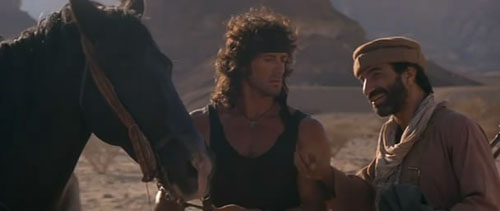
What Doesn’t Work:
It is telling that the words “first blood” have been completely dropped from the title at this point. First Blood is now a distant memory. The damage to the integrity of this franchise were already irreparably incurred with Rambo II, the cartoon and the toy line, so there isn’t really any point in continuing to harp on First Blood‘s betrayal. Thinking glass half full: the door was now open for Rambo III to go utterly bonkers and stretch its gonzo wings. And I wish it had. Alas. Rambo II may have shamefully whored out the character of John Rambo for cheap zeitgeist pandering, but one criticism you can’t lob at the film is saying it is boring. Rambo III is boring. At times surprisingly boring. As I said, the final third of the movie is a good time, but by then it is too little too late — I had already been lulled into a testy fit of anxious boredom.
The film’s opening, with Rambo living with the monks, is interesting on some basic level (at least it inspired some great parody in Hots Shots Part Deux), but it wastes story time. Trautman and embassy field officer Griggs (Kurtwood Smith) seek Rambo out, then talk with Rambo, then Rambo turns them down, then Trautman gets taken prisoner, then Griggs goes back to talk with Rambo, then Rambo decides to go to Afghanistan. That is some insincere story structure right there, and a perfect example of Stallone’s ego driven cake-and-eating-it problem from the 80’s. Oh, I see, Rambo has given up all this war tomfoolery. How honorable! Oh no! His buddy got kidnapped! Now he’s going to save him? How extra honorable! And tragic, cause he didn’t want to go! Well, I call bullshit. Why waste the audience’s time like that? Why not open the film with Trautman getting captured, then have Griggs track Rambo down to inform him what happened. Sure that is a little similar to Rambo II, but the plot is similar anyway (it’s a rescue mission), so who cares. It would have been better than the awkward structuring of repeating the same story beat twice in three sequential scenes — and all for the unsuccessful purpose of showing how totally over war Rambo is.
That is a minor quibble though. The bigger failure caused by Stallone’s image driven hero-building is that Rambo’s time spent fucking around with the Mujahideen is neither enlightening (about a foreign culture), nor entertaining, nor does it add anything to the character of John Rambo. It is pretty deplorable – coming for an Oscar-nominated screenwriter – that Stallone can’t let go of his ego long enough to allow Rambo to be interesting. Conceptually, Rambo III is a classic Noble White Man Saves Natives sort of film, but Stallone can’t even bring himself to follow the basic conventions of that template. Were this Avatar or The Last Samurai (or any Edward Zwick movie), Rambo would learn something from the Afghans; achieve some manner of character arc. Aside from learning the basic gist of Buzkashi (the dead sheep polo-meets-rugby game), Rambo doesn’t learn shit. He leaves the movie the way he came in, whereas conversely he’s totally inspired the Afghans and they now love him so much that they ask if he will stay.
Rambo III feels insecure. Usually a franchise is built around a character we will enjoy seeing dropped into any scenario, but I felt like the movie was trying incredibly hard to prove to me how likable John Rambo is. The problem is in the dialogue scenes. No longer feeling comfortable with Rambo’s Zen musings from Rambo II, now Sly has apparently decided that Rambo is witty. Rambo answers every question he’s ever asked with some sort of smugly cryptic remark or quip that seems to acknowledge he’s a movie character, given that the other characters never react like he’s being an asshole — which, objectively, he totally is. Take the moment where Rambo is examining the supplies Griggs sent him. When the Afghan helping Rambo asks him about a glow-stick, Rambo says, “It’s blue light.” When the guy, confused, asks what it does, Rambo says, “It turns blue.” On its own this is a minor amusing exchange, but this sort of conversational gag happens repeatedly throughout the film, especially during Rambo’s time with the Mujahideen. This frankly makes Rambo seem like a disrespectful prick. Can’t he deign to have a fucking real conversation with these poor people, to answer their questions so they understand him? It is rare to see a movie star who has creative control over his own franchise show such complete disregard (or misunderstanding) for his own character.
There is a “tough little kid” in the movie. Nuff said.
I liked getting more Trautman and I was entertained by their Butch and Sundance antics, but there is a troublesome speech Trautman gives Rambo in Act I. When trying to convince Rambo to come fight in Afghanistan with him, Trautman makes an analogy to the philosophy many sculptures have, which is that their statue was trapped inside the block of marble and they were simply freeing it. “We didn’t make you this fighting machine. We just chipped away the rough edges.” So… huh? This is basically the direct inverse of that moment that happens in movies where the hero has lost the magical item that gave them special abilities, and a supporting character says, “It wasn’t the amulet that gave you powers. You had it in you all along!” The Dumbo Feather Moment one might call it. Except Trautman is saying, “You were always a horrible monster inside, John. You were meant to kill hundreds and hundreds of people.” And Rambo doesn’t disagree with him, nor does it seem like we’re supposed to take Trautman’s comments as insulting. It is hard to buy Trautman as Rambo’s friend if this is how he feels about the man. And if we take this sentiment as irrelevant to their friendship, then it leaves us with the unattractive realization that we’re rooting for two psychopaths who love going to foreign countries and murdering people when “war” gives them the excuse to do so. And the film definitely seems to lean towards the latter. Rambo only seems contemplative and against fighting when he’s not in a war. Once he’s actually in the shit, he makes no effort whatsoever to injure people. He always goes for the kill as his first move (and Rambo III once held the Guinness Book of World Records stat for the most violent film). This obviously wasn’t the filmmakers’ intention, but it nonetheless creates the impression that Rambo secretly does love killing people. He’s like an addict that needs to go cold turkey to make himself stop. Otherwise, he revels in it, and the self-pity only comes after he sobers up again.
Rambo III has retroactively become historically amusing, due to the fact that many of the Mujahideen we supplied with weapons during the actual Soviet-Afghan Conflict later joined the Taliban. Osama Bin Laden was a supporter of the Mujahideen. Etc, etc. But that has nothing to do with the film itself. Plus, it still sorta holds up even in this context, given that the character of Masoud (Spiros Focás), the leader of Rambo’s Mujahideen group, is modeled on a real guy, Ahmad Shah Masoud, who fought against the Russian occupation and later became a leader in the fight against the Taliban regime — for which he was assassinated by suicide bombers on September 9, 2001. So, one could say that Rambo was indeed on the correct side, regardless of how history turned out. Though it would have been interesting if Rambo had decided to stay in Afghanistan at the end of the film. That certainly would’ve required some explanation at the beginning of the next film.
What is relevant to the film itself is that it feels self-righteous and at times completely full of shit. Trautman chastises Zaysen for trying to occupy Afghanistan. He does note that this will be the USSR’s Vietnam (which it was), but the stronger emphasis is the self-righteous “how dare you” tone of Trautman’s dialogue. This goes to the core of what is completely Reagan Era horseshit about Rambo III. We didn’t supply the rebels in Afghanistan with weapons because we cared about their plight. If a country we were friendly with had been occupying them, we would’ve released a press statement condemning violence and left it at that. We gave them weapons and trained them to fight because we didn’t want the Soviets expanding their power throughout the Middle East. The movie completely ignores this, making Trautman a champion for freedom, when it could’ve added dramatic weight to the film if Rambo initially went in to rescue Trautman but got caught up in the rebel’s cause after learning that Trautman didn’t actually give a shit about these people — being forced in a sense to choose between America and “what is right.”
What is up with playing Bill Medley’s cover of “He Ain’t Heavy, He’s My Brother” over the end credits? Where the hell did that idea come from?
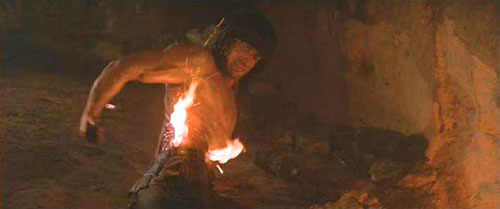
Rambody Count: 72.
Best Kill: Zaysen’s henchman, Kourov (Randy Raney). Rambo is fighting the strongman during the film’s extended climax. Caught in a deadly bear hug, Rambo pulls the pins on some grenades attached to Kourov’s jacket. When Kourov lets Rambo go in a panic, Rambo delivers a spinning kick which sends Kourov toppling backward into a hole. Kourov falls into the deep cavern beneath the mountain, tangled up in a repulsion cable. The cable serves as a noose, hanging Kourov, who is then given a dose of overkill when the grenades attached to his chest explode.
Most Badass Moment: After a piece of shrapnel pierces Rambo’s side in an explosion, Rambo is forced to perform some personal surgery. Removing the shrapnel looks painful, but the badass move comes when Rambo empties gunpowder from a bullet into both sides of his wound, then cauterizes it by igniting the powder (pictured above).
Most Ridiculous Moment: The climactic tank versus helicopter face-off, which ends with the two war machines literally driving directly into each other. That’s right, a tank and a helicopter meet nose-to-nose. Rambo is in the tank. He wins.
Best Line About How Badass Rambo Is:
Zaysen: Are you insane? One man against trained commandos… Who do you think this man is? God?
Trautman: No. God would have mercy. He won’t.
Best Sensitive Rambo Line:
Moussa: This is not your war.
Rambo: It is now.
Best Badass Rambo Line: In response to who he is. “Your worst nightmare.”
Should There Have Been a Sequel: No.
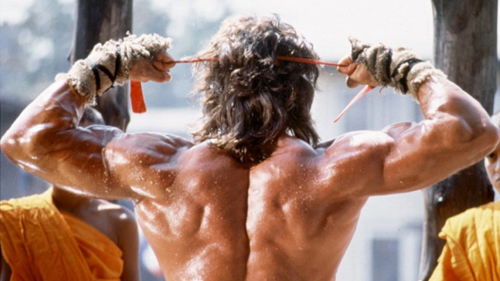
Up Next: Rambo.
previous franchises battled
Critters
Death Wish
Leprechaun
Phantasm
Planet of the Apes
Police Academy
Tremors